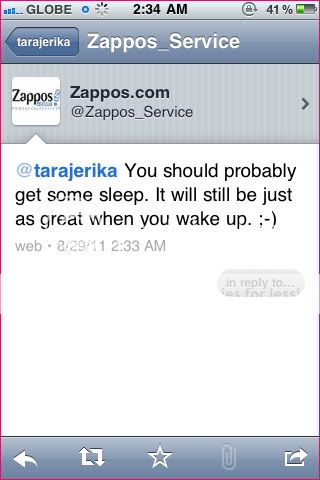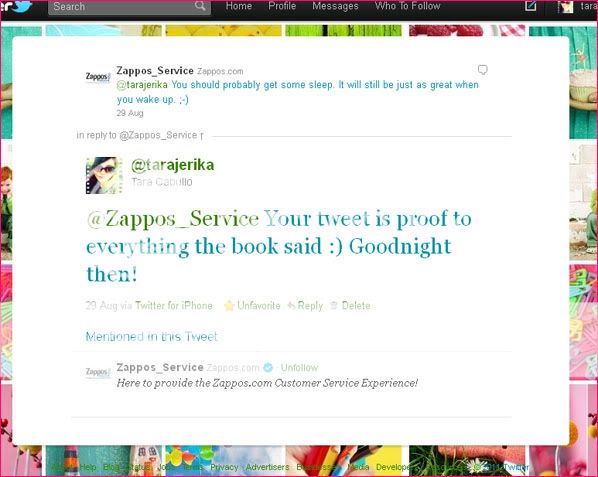Delivering Happiness
Let me start this post by saying I am neither a book expert nor a corporate culture expert. I am just a happy book reader who happened to have read this book two and a half months ago, lent it to a couple of friends and before I knew it, the book had the same effect on us:
To say it was inspiring is kind of an understatement.
I knew Zappos as much as I knew another website, Asos, because I'd been checking them out regularly for new things to online/window shop for. I had no clue at how long it took to build the website, or that Zappos almost went out of business and other things.
One thing I knew was that I read in some article that one of the best companies to work for was Zappos and that one of its founders, Tony Hsieh, {one of the three people I admire the most} changed the face of corporate culture. One day at Fully Booked, I was in search of another book and I found a lone copy of Delivering Happiness. I started reading it on my way to Bolinao and finished it on the second night.
If taken at face value, I would probably never understand why this book was going to be important to me or to what I do. After all, I am not part of the customer service group {customer service being the thrust of the book} of the company and I am a Marketing person. I was wrong.
While indeed, customer service was a huge value and insight of the book, my biggest takeaway simply had to be the culture. And that happiness of both customers and employees as a business model is not bad at all.
Tony believed that the biggest drivers of business success is a huge and cemented belief in the company. In one of the chapters, he shared how he hires on the basis of how well the candidates would fit into the company, rather than relying on the candidates' skills alone. I remember a former colleague who once chose the current girl I'm working over a guy {who could've saved us travel money since he could room up with the other guys}. "He isn't a team player," she says. Looking back {hello, Steve Jobs wisdom!}, the rationale makes so much sense as this girl {that's C!}and I {among others} worked well with other people, some from the team, and some from other departments. If it were the other guy, it would've been a bad thing. He wouldn't have fitted into our group dynamic that's hinged on collaboration and friendship.
Another one of Tony's key sharing is that employees must know {and love} the values. That is not to say that every single employee must follow like a blind robot. Embracing the core values {a thing an employee must check before entering a contract, too!} is a step to be undertaken for a tighter, more identified culture.
And if you're an employee, you'd relate to this: culture is one of the biggest maker or breaker of employer choice. Agree?
This is not a bad example:
I am pretty amazed how they delivered happiness to me despite not being a customer YET {they don't deliver outside of the US just yet}. It's infinitely amazing. And I am recommending this to everyone I know.
To say it was inspiring is kind of an understatement.
I knew Zappos as much as I knew another website, Asos, because I'd been checking them out regularly for new things to online/window shop for. I had no clue at how long it took to build the website, or that Zappos almost went out of business and other things.
One thing I knew was that I read in some article that one of the best companies to work for was Zappos and that one of its founders, Tony Hsieh, {one of the three people I admire the most} changed the face of corporate culture. One day at Fully Booked, I was in search of another book and I found a lone copy of Delivering Happiness. I started reading it on my way to Bolinao and finished it on the second night.
If taken at face value, I would probably never understand why this book was going to be important to me or to what I do. After all, I am not part of the customer service group {customer service being the thrust of the book} of the company and I am a Marketing person. I was wrong.
While indeed, customer service was a huge value and insight of the book, my biggest takeaway simply had to be the culture. And that happiness of both customers and employees as a business model is not bad at all.
Tony believed that the biggest drivers of business success is a huge and cemented belief in the company. In one of the chapters, he shared how he hires on the basis of how well the candidates would fit into the company, rather than relying on the candidates' skills alone. I remember a former colleague who once chose the current girl I'm working over a guy {who could've saved us travel money since he could room up with the other guys}. "He isn't a team player," she says. Looking back {hello, Steve Jobs wisdom!}, the rationale makes so much sense as this girl {that's C!}and I {among others} worked well with other people, some from the team, and some from other departments. If it were the other guy, it would've been a bad thing. He wouldn't have fitted into our group dynamic that's hinged on collaboration and friendship.
Another one of Tony's key sharing is that employees must know {and love} the values. That is not to say that every single employee must follow like a blind robot. Embracing the core values {a thing an employee must check before entering a contract, too!} is a step to be undertaken for a tighter, more identified culture.
And if you're an employee, you'd relate to this: culture is one of the biggest maker or breaker of employer choice. Agree?
This is not a bad example:
It's so good that I was convinced I'd work for Zappos given the chance.
I could quote a thousand more lessons I gathered from reading Hsieh's {pronounced as shay} but that would ruin the beautiful surprise that is in each page of this book. Granted, Hsieh was not a writer, however I think he is a visionary. He formed the company from the perspective of the heart and passion and happiness and succeeded. I don't think that's a bad model at all.
Oh and incidentally, I had been tweeting while I was reading the book:
See their reply. Who wouldn't want to be a customer after that?
But I am too happy to answer, too:
I am pretty amazed how they delivered happiness to me despite not being a customer YET {they don't deliver outside of the US just yet}. It's infinitely amazing. And I am recommending this to everyone I know.
If you're planning on reading this, let me know so we can talk about this all day! xx




